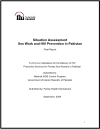Reviews and Snapshots - Released in 2009
In 2009, the NACP selected Family Health International to provide technical assistance to NACP, PACPs and local organizations for strengthening HIV prevention interventions. One of the deliverables under the technical assistance is this Situation Assessment Report, documenting lessons learned in Pakistan and forming the basis of the design of other studies, strategies and interventions to be carried out under the Technical Assistance.
The size of the FSW population and their high number of sexual partners suggests that the expansion of the HIV epidemic is likely to be strongly influenced by the extent of the epidemic among FSWs and their clients, even though current HIV prevalence among FSW is low. Several recent surveys have shown that although prevalence among FSW is low, their risk is high and the epidemic potential is considerable because condom use is low and sexual partnerships of FSWs with IDUs are reported by over 10% of the female sex worker population surveyed.
Specific objectives of the assessment were to:
- Assess the structure of the sex trade, changes taking place and implications for reaching target groups Understand the legal and policy environment and its impact on the services for sex workers
- To assess knowledge, attitude and practice of female sex workers and sexual networking patterns
- To assess involvement of target population in the implementation of HIV prevention activities
- To explore opportunities and constraints for formation/operation of FSW self-help groups
- To assess the capacity of NGOs to deliver services for female sex workers
- To assess the roles and responsibilities of Provincial AIDS Control Programs
Downloads
Organizations
- FHI 360 (Family Health International)






